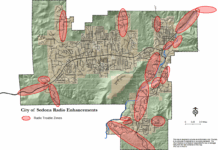
Another of the city of Sedona’s ongoing lawsuits — involving the owners of the proposed Oak Creek Heritage Lodge — is moving forward through the Yavapai County court system and should come to trial by the end of 2025, or possibly early in 2026.
Following the Planning and Zoning Commission’s April 16 approval of a development review for RD Olson Development’s proposed Oak Creek Heritage Lodge off Schnebley Hill Road, the Sedona City Council heard appeals of the commission’s decision on June 25 that were filed by two groups of residents, one composed of Lauren Thomas and Christine Wagner, and one composed of Carol Breen, Nancy Friedman, Ann Kelley, Sean Smith and Mark TenBroek.
The council subsequently overturned the commission’s decision by a 4-3 vote, with Mayor Scott Jablow, Vice Mayor Holli Ploog, Councilwoman Melissa Dunn and Councilman Brian Fultz arguing that the project did not meet Land Development Code requirements for project type, building size and traffic and environmental mitigation, and that the LDC gave them the ability to determine whether or not the proposal met LDC requirements rather than limiting them to reviewing the commission’s decision for procedural errors.
RD Olson Development then sued the city of Sedona, as well as each member of Sedona City Council and each of the appellants, in Yavapai County Superior Court on July 24, charging the council with “effectuating [sic] a zoning decision in the context of an administrative appeal” and seeking reversal of the council’s decision.
According to the joint report filed with the Superior Court on Oct. 11, the city has entered motions to dismiss RD Olson’s allegations that “provisions of the city’s Land Development Code allow the city to wield legislative power within the context of an administrative review application, which is prohibited by state statute” and “that the council abused its discretion in re-weighing the evidence presented to the commission.”
The city also contends that “the council’s decision to overturn the commission was not arbitrary and capricious, but was supported by the evidence.”
Wagner, who is representing herself, filed a separate motion to dismiss the lawsuit. TenBroek requested a time extension to respond to the complaint “for medical reasons,” while Thomas requested an extension for unspecified reasons. The remaining defendants have been dismissed from the suit.
While RD Olson and the city have reached agreement on the appropriateness of Tier 2 discovery for the proceedings, “Defendant Wagner does not agree … and further contends that no discovery, other than the underlying administrative record, should be considered by the court.”
All parties, with the exception of Wagner, have also agreed to “engage in settlement discussions with a settlement judge or private mediator,” while Wagner “contends that settlement discussions [sic] is not appropriate in this matter.” Mediation is scheduled for completion by July 11, 2025.
Wagner, according to the joint report, also “questions the applicability of Rule 16 to this special action,” and “contends that the filing of this joint report is premature.”
Rule 16 of Arizona Rules of Civil Procedure sets out requirements for courts’ handling of scheduling and case management issues related to civil actions.
The Superior Court has not yet ruled on the city’s motions for dismissal and the parties to the suit anticipate that answers to the complaint will be filed by Dec. 13. A trial lasting 10 days is currently expected to take place after Nov. 10, 2025.
The yellow-billed cuckoo, whose nesting habits and rarity along Oak Creek Thomas invoked during her appeal, has not yet been named as a defendant in the suit.
On Oct. 28, the U.S. Geological Survey announced that “a new paper published in the Journal of Field Ornithology documents, for the first time, the wide extent of their occurrence and nesting in arid habitats in foothill, mountain and lowland drainages of the ‘Sky Islands’ in southeast Arizona.”




















